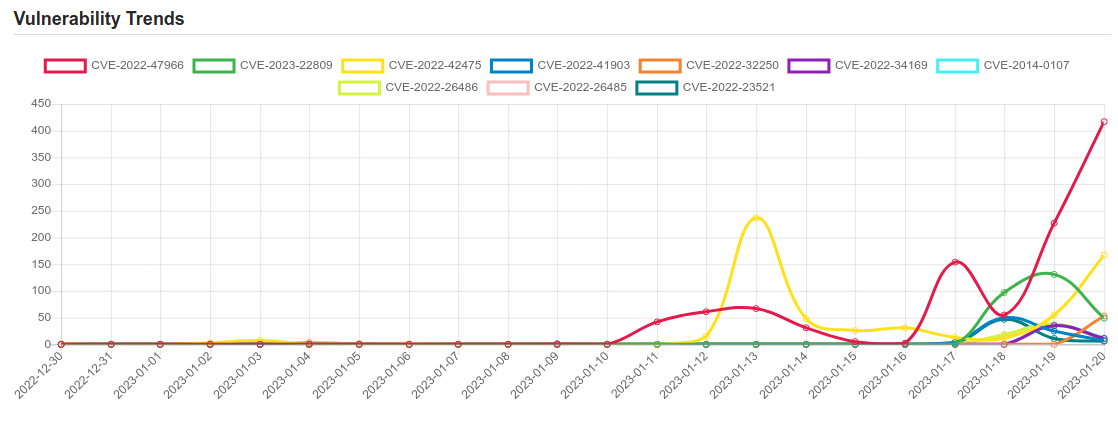Daily Vulnerability Trends: Sat Jan 21 2023

| CVE NAME | CVE Description |
| CVE-2022-4873 | On Netcomm router models NF20MESH, NF20, and NL1902 a stack based buffer overflow affects the sessionKey parameter. By providing a specific number of bytes, the instruction pointer is able to be overwritten on the stack and crashes the application at a known location. |
| CVE-2022-4498 | In TP-Link routers, Archer C5 and WR710N-V1, running the latest available code, when receiving HTTP Basic Authentication the httpd service can be sent a crafted packet that causes a heap overflow. This can result in either a DoS (by crashing the httpd process) or an arbitrary code execution. |
| CVE-2022-4499 | TP-Link routers, Archer C5 and WR710N-V1, using the latest software, the strcmp function used for checking credentials in httpd, is susceptible to a side-channel attack. By measuring the response time of the httpd process, an attacker could guess each byte of the username and password. |
| CVE-2022-21587 | Vulnerability in the Oracle Web Applications Desktop Integrator product of Oracle E-Business Suite (component: Upload). Supported versions that are affected are 12.2.3-12.2.11. Easily exploitable vulnerability allows unauthenticated attacker with network access via HTTP to compromise Oracle Web Applications Desktop Integrator. Successful attacks of this vulnerability can result in takeover of Oracle Web Applications Desktop Integrator. CVSS 3.1 Base Score 9.8 (Confidentiality, Integrity and Availability impacts). CVSS Vector: (CVSS:3.1/AV:N/AC:L/PR:N/UI:N/S:U/C:H/I:H/A:H). |
| CVE-2022-35690 | Adobe ColdFusion versions Update 14 (and earlier) and Update 4 (and earlier) are affected by a Stack-based Buffer Overflow vulnerability that could result in arbitrary code execution in the context of the current user. Exploitation of this issue does not require user interaction, the vulnerability is triggered when a crafted network packet is sent to the server. |
| CVE-2022-34718 | Windows TCP/IP Remote Code Execution Vulnerability. |
| CVE-2022-44877 | login/index.php in CWP (aka Control Web Panel or CentOS Web Panel) 7 before 0.9.8.1147 allows remote attackers to execute arbitrary OS commands via shell metacharacters in the login parameter. |
| CVE-2021-3490 | The eBPF ALU32 bounds tracking for bitwise ops (AND, OR and XOR) in the Linux kernel did not properly update 32-bit bounds, which could be turned into out of bounds reads and writes in the Linux kernel and therefore, arbitrary code execution. This issue was fixed via commit 049c4e13714e (“bpf: Fix alu32 const subreg bound tracking on bitwise operations”) (v5.13-rc4) and backported to the stable kernels in v5.12.4, v5.11.21, and v5.10.37. The AND/OR issues were introduced by commit 3f50f132d840 (“bpf: Verifier, do explicit ALU32 bounds tracking”) (5.7-rc1) and the XOR variant was introduced by 2921c90d4718 (“bpf:Fix a verifier failure with xor”) ( 5.10-rc1). |
| CVE-2023-22809 | In Sudo before 1.9.12p2, the sudoedit (aka -e) feature mishandles extra arguments passed in the user-provided environment variables (SUDO_EDITOR, VISUAL, and EDITOR), allowing a local attacker to append arbitrary entries to the list of files to process. This can lead to privilege escalation. Affected versions are 1.8.0 through 1.9.12.p1. The problem exists because a user-specified editor may contain a “–” argument that defeats a protection mechanism, e.g., an EDITOR=’vim — /path/to/extra/file’ value. |
| CVE-2022-42475 | A heap-based buffer overflow vulnerability [CWE-122] in FortiOS SSL-VPN 7.2.0 through 7.2.2, 7.0.0 through 7.0.8, 6.4.0 through 6.4.10, 6.2.0 through 6.2.11, 6.0.15 and earlier and FortiProxy SSL-VPN 7.2.0 through 7.2.1, 7.0.7 and earlier may allow a remote unauthenticated attacker to execute arbitrary code or commands via specifically crafted requests. |
| CVE-2022-41903 | Git is distributed revision control system. `git log` can display commits in an arbitrary format using its `–format` specifiers. This functionality is also exposed to `git archive` via the `export-subst` gitattribute. When processing the padding operators, there is a integer overflow in `pretty.c::format_and_pad_commit()` where a `size_t` is stored improperly as an `int`, and then added as an offset to a `memcpy()`. This overflow can be triggered directly by a user running a command which invokes the commit formatting machinery (e.g., `git log –format=…`). It may also be triggered indirectly through git archive via the export-subst mechanism, which expands format specifiers inside of files within the repository during a git archive. This integer overflow can result in arbitrary heap writes, which may result in arbitrary code execution. The problem has been patched in the versions published on 2023-01-17, going back to v2.30.7. Users are advised to upgrade. Users who are unable to upgrade should disable `git archive` in untrusted repositories. If you expose git archive via `git daemon`, disable it by running `git config –global daemon.uploadArch false`. |
| CVE-2022-32250 | net/netfilter/nf_tables_api.c in the Linux kernel through 5.18.1 allows a local user (able to create user/net namespaces) to escalate privileges to root because an incorrect NFT_STATEFUL_EXPR check leads to a use-after-free. |
| CVE-2022-34169 | The Apache Xalan Java XSLT library is vulnerable to an integer truncation issue when processing malicious XSLT stylesheets. This can be used to corrupt Java class files generated by the internal XSLTC compiler and execute arbitrary Java bytecode. The Apache Xalan Java project is dormant and in the process of being retired. No future releases of Apache Xalan Java to address this issue are expected. Note: Java runtimes (such as OpenJDK) include repackaged copies of Xalan. |
| CVE-2014-0107 | The TransformerFactory in Apache Xalan-Java before 2.7.2 does not properly restrict access to certain properties when FEATURE_SECURE_PROCESSING is enabled, which allows remote attackers to bypass expected restrictions and load arbitrary classes or access external resources via a crafted (1) xalan:content-header, (2) xalan:entities, (3) xslt:content-header, or (4) xslt:entities property, or a Java property that is bound to the XSLT 1.0 system-property function. |
| CVE-2022-3656 | Insufficient data validation in File System in Google Chrome prior to 107.0.5304.62 allowed a remote attacker to bypass file system restrictions via a crafted HTML page. (Chromium security severity: Medium) |
A considerable amount of time and effort goes into maintaining this website, creating backend automation and creating new features and content for you to make actionable intelligence decisions. Everyone that supports the site helps enable new functionality.
If you like the site, please support us on Patreon using the button below

To keep up to date follow us on the below channels.






